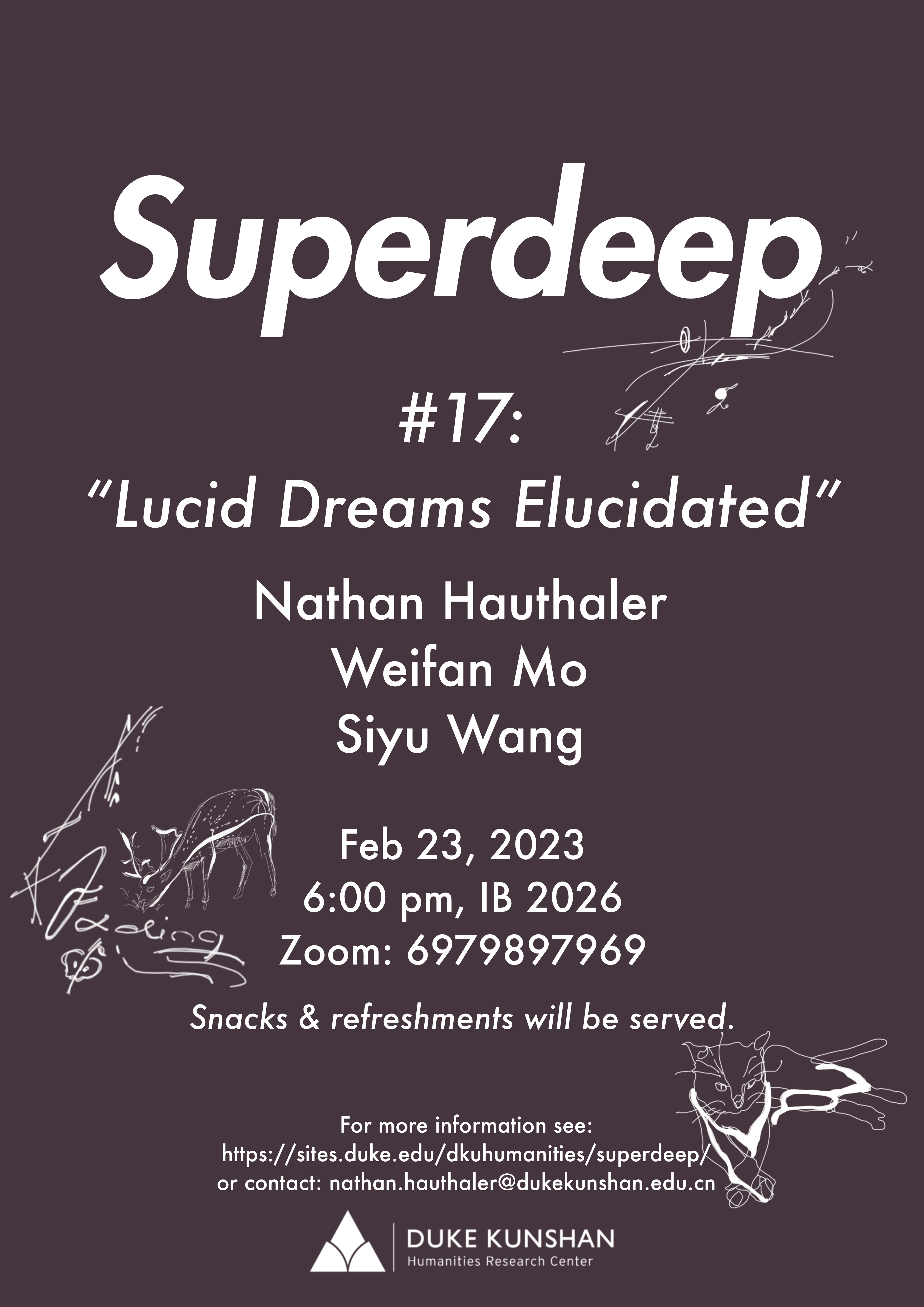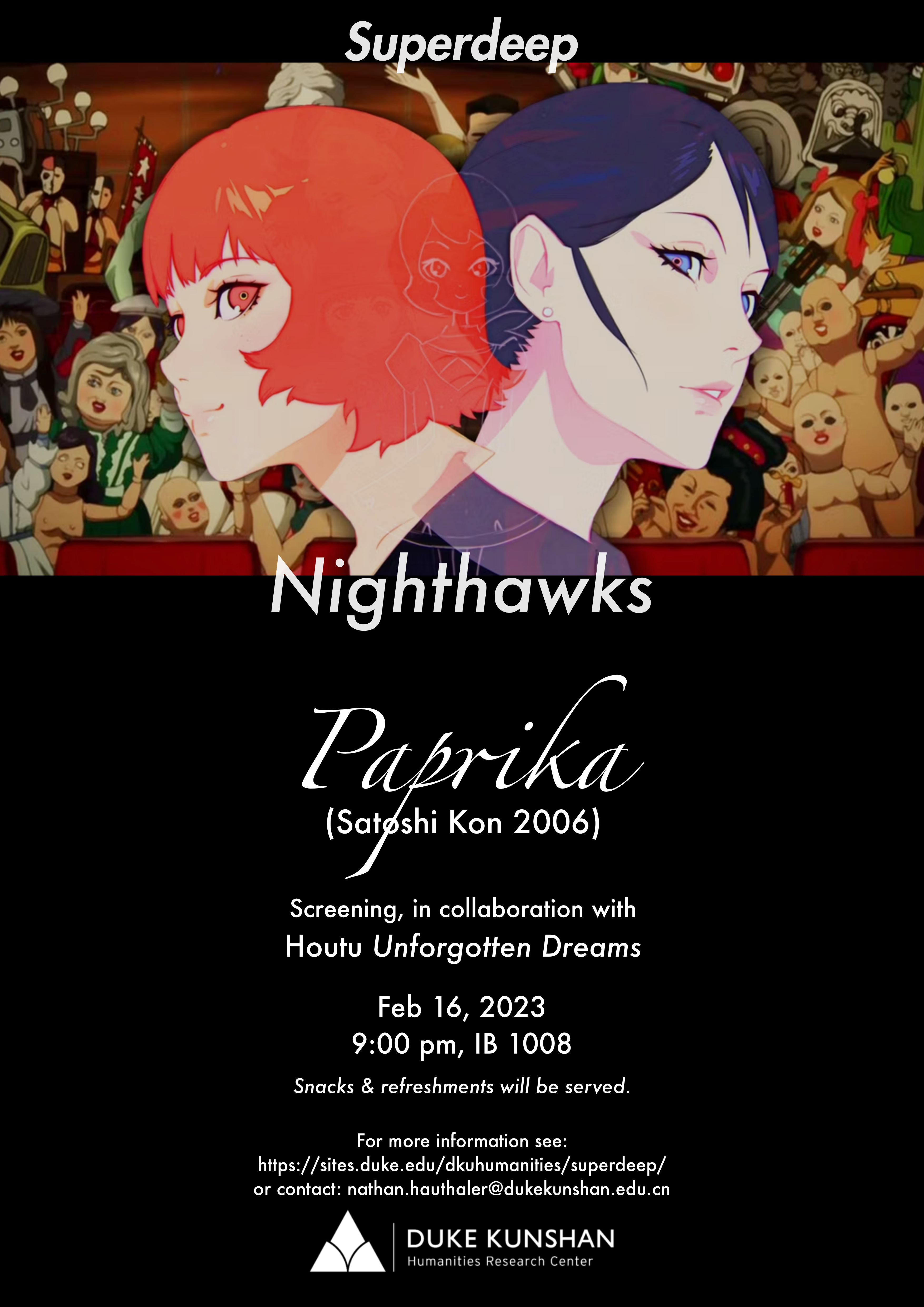Student Report: Superdeep#16: “ChatGPT” with Tim Fitz (Turnitin)
 Reported by Dongkun Lyu (with ChatGPT)
Reported by Dongkun Lyu (with ChatGPT)
Before I started to write a report, I asked ChatGPT:
“Could you please write around a 300 words seminar report for me? The date is Feb 1, 2023. People are Tim Fitz (engineer of Turnitin), Professor Daniel Lim and DKU professors and student. The content is encompassing the research area of the speakers, the process of the development of AI, their experience and thought of ChatGPT and some classic computer experiment like ‘The Turing test’ and ‘Chinese character test’.”
Consequently, most of this report, except for the first paragraph (because it repeats the information I was given), was not useful. (more…)
Superdeep #17: “Lucid Dreams Elucidated” (Mo, Wang, & Hauthaler) | Thu Feb 23, 6pm
 IB 2026 | Zoom 69 79 89 79 69
IB 2026 | Zoom 69 79 89 79 69
Join us for our next Superdeep workshop meeting, in which Weifan Mo (E&L Philosophy ’23), and Siyu Wang (E&L Philosophy ’25), and Nathan Hauthaler will revel in “Lucid Dreams Elucidated”.
Soon after the workshop, the Superdeep Nighthawks will continue to shine their late projector light on dreams of Michel Gondry‘s 2004 Eternal Sunshine of the Spotless Mind.
As always, everyone is welcome to join; no prior knowledge of philosophy is required. And, as always, snacks and refreshments will be served at the meeting.
– – – – – – –
For more information on DKU’s Superdeep workshop,
see https://sites.duke.edu/dkuhumanities/superdeep/
or contact Nathan Hauthaler.
Student Report on Linguistics, Humanities, and Data Sciences: Their Intersections and Implications
Reported by Yongkun Vicky Wu, class of 2026
This talk by Yachao Sun, Xiaofei Pan, and Ge Lan on Linguistics, Humanities, and Data Sciences: Their Intersections and Implications is part of the Third Space Lab (TSL) Brown Bag Lunch Research Talk. The program is broadly associated with research projects related to languages, cultures, and intercultural communication.
This research talk given by Prof Yachao Sun, Xiaofei Pan, and Ge Lan was divided into four parts: introduction to the project, the Data+X research, the Stanza paper, and to the progress of the project and call for collaboration.
Anthropocene XR Lab Presents “A Room of One’s Own: novel interactions and contextual storytelling in virtual spaces”
A ROOM OF ONE’S OWN: novel interactions and contextual storytelling in virtual spaces.
Date/Time: Tues, Feb 21, 9-10am China time
Zoom ID: 93375892386
Speaker: RAY LC. Assistant Professor of Creative Media, City University of Hong Kong
Virtual environments provide ways to intervene in the storytelling process, both by showing the context in which the narrative takes place and by applying interactions that go beyond the physical world to model mental conceptions. This talk describes a body of research in art, design, and human-computer research focused on understanding new interactions with the VR paradigm in both naturalistic and created environments, applied to storytelling for marginalized groups, sub culture communities, and artistic applications.
Citizenship Lab Grant Project Seeking Student Researcher
Citizenship Lab’s grant project, “The role of citizens in lawmaking in China,” led by Professor Annemieke van den Dool, is seeking a research assistant.
Deadline: Feb 28, 2023
Job title: Student researcher
Job description/responsibilities: (more…)
Student Report: Humanities Research Lunch
Reported by Mateja Bokan, Class of 2025
The Humanities Research Center organized a Humanities Research Lunch for undergraduate students interested in discovering humanities disciplines and research at DKU. During the event, students had the opportunity to talk to Arts and Humanities faculty and hear about research opportunities, but also get acquainted with the work of the Humanities Research Center and its labs.

Superdeep Nighthawks: “Paprika” (Kon 2006) | Thu Feb 16, 9pm
IB 1008 (IB Auditorium)

The Superdeep Nighthawks multiplied into a force of forty for their first gathering on Feb 9. On Thu, Feb 16 they will return in force, to savor Satoshi Kon‘s 2006 animated feature Paprika (…& food & drink).
HRC Superdeep Nighthawks meet on Thu eve (9pm till late). The Paprika screening is the second in a series of screenings hosted in collaboration with the Houtu Research project Unforgotten Dreams, in preparation for Superdeep #17 (“Lucid Dreams Elucidated”).
Third Space Lab Brown Bag Lunch Research Talk: Linguistics, Humanities, and Data Sciences: Their Intersections and Implications
You are cordially invited to attend the TSL Brown Bag Lunch Research Talk by Yachao Sun, Xiaofei Pan, Ge Lanon Linguistics, Humanities, and Data Sciences: Their Intersections and Implications.
Date/Time: Friday, Feb. 17, 12pm, (China Standard Time).
Location: IB 2026
Snacks and bubble teas provided.
Please RSVP by 5 pm Thursday Feb. 16: https://duke.qualtrics.com/jfe/form/SV_1Na5ryXivJDlIzA (more…)
Religion+Opera, with Kim Hunter Gordon and Don Snow
Date/Time: February 21, 6:30-8pm
Location: DKU Water Pavilion
Computational Humanities Seminar Series: Estimating Remaining Lifespan from the Face
Computational Humanities Seminar Series
Date: Feb 24 (Friday) 10 AM, China time
Meeting ID: 987 3096 4006
Passcode: 2023
Abstract: The face is a rich source of information that can be utilized to infer a person’s biological age, sex, phenotype, genetic defects, and health status. All of these factors are relevant for predicting an individual’s remaining lifespan. In this study, we collected a dataset of over 24,000 images (from Wikidata/Wikipedia) of individuals who died of natural causes, along with the number of years between when the image was taken and when the person passed away. We made this dataset publicly available. We fine-tuned multiple Convolutional Neural Network (CNN) models on this data, at best achieving a mean absolute error of 8.3 years in the validation data using VGGFace. However, the model’s performance diminishes when the person was younger at the time of the image. To demonstrate the potential applications of our remaining lifespan model, we present examples of using it to estimate the average loss of life (in years) due to the COVID-19 pandemic and to predict the increase in life expectancy that might result from a health intervention such as weight loss. Additionally, we discuss the ethical considerations associated with such models. (more…)